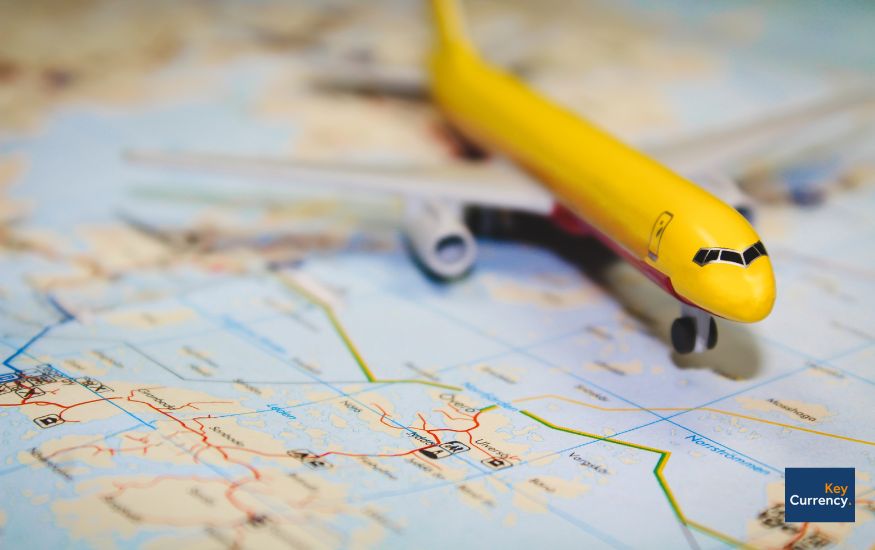 Author, Mike Smith
Author, Mike Smith
Last Updated on August 14th, 2024
The decision to relocate abroad, whilst exciting, comes with many things to consider.
One crucial aspect often gets overlooked – transferring your money.
Clever financial management is essential to ensure a smooth transition to your new life abroad, whether moving as a family, an individual, or for work purposes.
In this article, we’ll look at the essential steps to help you transfer your money cost-effectively when moving to another country.
Get a Great Rate on Your Money Transfers
Informing your bank
Be sure to inform your bank and other financial institutions, such as mortgage lenders and building societies, about your international move.
This can help to prevent any queries about unexpected international payments.
Your existing bank will be able to offer you some essential services for living abroad, such as foreign currency accounts or international debit cards.

Beware of hidden bank fees
Banks can often impose fees for international transactions and currency conversion.
Be sure to make yourself fully aware of the fees your bank may charge, especially when transferring money from a UK bank account to an international one.
Below is an example of some high street bank charges for international transfers.
| Bank | Incoming International | Outgoing International |
| Metro Bank | £0 | £15-£25 |
| NatWest | Up to £7.50 | Up to £15 |
| RBS | Up to £7.50 | Up to £15 |
| Santander | £0 | Up to £25 |
Note – The big cost tends to be hidden in the exchange rate. You will find banks are rarely the best option when it comes to transferring your money abroad.
Choosing the right money transfer method
At some point, you will need to transfer funds from home to abroad.
This is especially relevant if you are in the fortunate position to be able to purchase your international property.
Let’s have a look at some of the best ways to do this…
You have several options when transferring money to another country, including your bank, online apps, and currency brokers.
Whilst each method has pros and cons, detailed below, it’s essential to mention that currency brokers often offer more favourable exchange rates and lower fees.
This makes them an attractive choice for regular or large money transfers between countries.
It’s easy and convenient to use your bank to send money abroad – it is also safe and secure. However, if you’re sending large amounts, you may get a better exchange rate from a currency broker as well as personal assistance.
| Transfer Service | Pros | Cons | Best For |
| Banks | Convenient and familiar. | Transfer fees, high charges, and not the best exchange rates. | One-off payments abroad. |
| Online Apps | Quick transfer times. | Transfer fees, no personal service, daily transfer limits. | Small international money transfers. |
| Currency Brokers | No fees, competitive exchange rates, personal service. | Need to register before you can use the service. | Large or regular money transfers abroad. |
Compare transfer services
Before choosing a transfer service, compare fees, exchange rates, and transfer times.
- Speed, costs, and support are some factors to consider when sending money abroad.
- Banks can transfer money overseas, but worse exchange rates and higher fees can make them more expensive than alternatives.
- SWIFT payments and wire transfers are suitable for large transactions but have higher fees and longer processing times.
Understanding exchange rates
International exchange rates fluctuate daily, impacting the value of your money when transferring it to another currency.
An exchange rate is the rate at which one currency can be exchanged for another between nations or economic zones. It is used to determine the value of various currencies about each other and is vital in determining trade and capital flow dynamics.
A currency transfer specialist can give you up-to-the-minute advice on exchange rates.
Currency conversion will significantly impact the amount of money you receive when making an international transfer.
Using a specialised money transfer company such as Key Currency can help you ensure the most favourable exchange rate.
How to set up an international bank account
Setting up a bank account in your new home country before you move can make things much easier, and cheaper, for you, once you arrive.
A good tip is to speak with your existing bank to see if they have a banking presence in your destination country.
For example, HSBC and Barclays are among the 10 largest banks in the US, so they could help you open an account from the UK should you relocate to the USA.
Many UK banks offer foreign currency accounts, which allow you to hold multiple currencies in a single account.
These accounts can be beneficial if you regularly receive income in different currencies or plan to move funds between countries frequently.
Top tips from our team!
As we have many team members working across Europe and further afield, we have an innate understanding of the financial aspects to consider when making your move.
One of our independent agents, Hilary Crane, who moved to Spain 14 years ago, shares her insider top 5 tips for keeping on top of your finances when making the move from the UK to abroad.
Understand local tax laws!
Making sure your taxes are in order, especially when purchasing a property is paramount.
Employing the services of a local tax advisor who fully understands the tax implications you will have to manage is highly recommended.
Capital gains tax on property sales and other disposals are a good example of what you may need to consider.
Look into whether or not there is a double-tax agreement between the UK and your destination country and how it applies to you.
Get covered – insurance.
Access to medical care is vital for anyone moving abroad, and it will most likely be necessary to take our private medical insurance for you and your family.
Life and home insurance are also important, look at price comparison sites for the best rates, and contact companies directly for personalised quotes.
Keep a close eye on exchange rates.
If you need to move money regularly to your new country of residence, it’s important to make sure you do so at a time when the exchange rate is favourable.
It can often take at least a couple of years to settle into a new country, and then buy a house.
It’s so important to get to know your new location before settling in a specific area.
Many expats choose to keep funds in their original bank account until they need it, and then transfer when the exchange rate is at an attractive rate.
Your currency broker can help you with this and advise you when it is a good time to transfer funds.
Create a budget for your new location.
Do your research and speak to other locals to get an idea of how much your outgoings will be when you move abroad and budget accordingly.
You may find costs such as food and utilities are less expensive than in the UK, but other expenses like buying a car cost much more, for example.
Get your documents in order!
Having all your paperwork in order will make your move easier.
Registering your new address, opening a bank account, or getting healthcare coverage generally requires lots of form filling and you will need all of your essential documents to hand.
For example, make sure you have your passport, driver’s license, bank statements, and other forms of ID easily accessible, and have both paper and electronic copies.
At Key Currency, we help thousands of customers moving abroad with their money transfers and can offer invaluable advice. We can serve customers throughout the UK, EU, Middle East, and Australasia and can transfer money in 39 different currencies. Our exchange rates are highly competitive, and we don’t charge any fees. Our expert team of traders works closely with you with your best interests at heart, we won’t push you into a trading platform and make you do everything yourself. All our customers have an account manager who will help you from start to finish and help you with the timing of your transfer when moving to your new country. Get a free quote today and see how we can help you!
More moving abroad & money transfer guidance…


